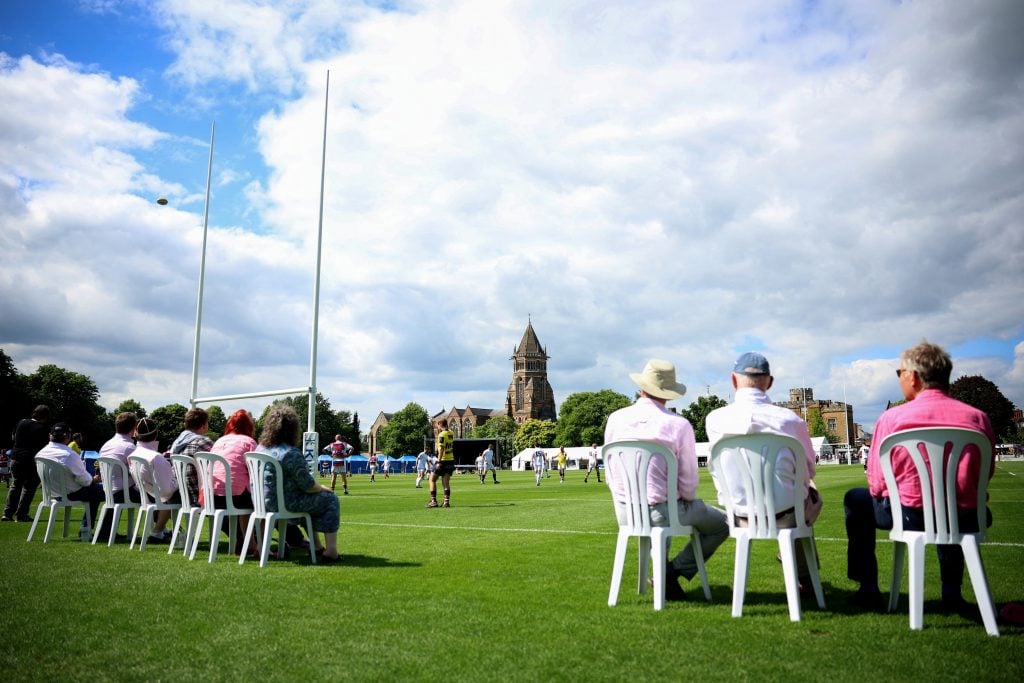In September 2025, Nigeria is set to begin a new chapter in its educational landscape with the launch of Rugby School Nigeria – an ambitious offshoot of the prestigious UK private school (pictured above). Built in partnership with businessman and philanthropist Ronald Chagoury and located in Lagos’ Eko Atlantic development, the school aims to marry British academic tradition with African culture.
The venture will be headed by principal Adam England, an educator and school design consultant with two decades of global experience, most recently as director general of Ecole International Ruban Vert in Libreville, Gabon.
The project comes at a time when many African families are re-evaluating the value of sending children abroad for secondary education. With the rising cost of international school fees, increasingly restrictive visa policies and ongoing currency pressures in key markets such as the UK and US, the appeal of elite education at home is growing, and Rugby School Nigeria seeks to respond directly to that demand.
“The moment you arrive in Lagos, you’re struck by its incredible energy – a true melting pot of ethnicities, cultures, food and art. It’s an inspiring and dynamic environment, and there’s no better place to establish a school. The people here work incredibly hard to make tomorrow better than today, and the determination and drive of Nigerian students are remarkable. If we were coming to Africa, it had to be Nigeria. And if Nigeria, then it had to be Lagos – its vibrancy and diversity create the ideal conditions for educational excellence,” says England.
Teaching the Nigerian elite
The school will initially offer a two-year A-level programme for day students aged 16 to 18, with plans to expand into a full 11–18 model in September 2026, offering both day and boarding. Unsurprisingly, the target demographic is Nigeria’s upper-middle and high-income families, along with Nigerians in the diaspora.
Fees are expected to be in the region of $22,500 per annum, a figure lower than comparable boarding school costs in the UK, especially in light of recent UK tax policy changes introducing 20% VAT on private school fees.
Nevertheless, Rugby School Nigeria is not positioning itself solely as a low-cost alternative. It is also part of a broader push to recalibrate what premium education can look like in an African context – less about importation and more about adaptation. Rather than merely replicating the British academic model, the school aims to infuse it with African cultural relevance. The curriculum, while UK-aligned, will reflect local realities. In practice, this means incorporating African authors into literature syllabi, using Nigerian geographies to teach environmental science, and ensuring that history isn’t stripped of context.
“The curriculum must remain quintessentially British and delivered to a high standard, but it should also reflect the local context where relevant,” says England. “If you’re teaching coastal erosion, take students to the Lagos beachfront and speak with the teams installing groynes – they love that real-world connection. In literature, why not include Chimamanda Ngozi Adichie? She’s one of the world’s leading writers. And in history, African narratives are among the richest there are – don’t reduce them to a Eurocentric, post-colonial perspective. Our goal has always been to preserve that British foundation while making meaningful local adaptations.”
An appropriately African education
This approach reflects a broader shift in the continent’s private education sector. International brands have come to view African markets as ripe for expansion, but success depends on navigating complex questions around cultural authenticity, local engagement, and equity.
Across African capitals, there is a growing visibility of costly international schools that appear detached from their surroundings. Rugby School Nigeria says it is keen to differentiate itself from this model. While its target market remains the wealthy elite, there are efforts to present the school as part of the wider educational landscape in Lagos. One proposed initiative is to open the school’s international-standard rugby pitch to national teams and local sports organisations. Popular legend has it that the sport was invented at Rugby School by pupil William Webb Ellis, while the rules of txhe game were certainly codified there in 1845.
Another is the development of teacher training partnerships with public schools across the region.
Whether these initiatives materialise as impactful programmes or remain simply symbolic gestures will likely determine how the school is received beyond its immediate parent base. But the intent is clear: Rugby School Nigeria is not an institution that plans to hide behind wrought iron gates.
While international in scope, with teachers joining from across Africa, Europe and Asia, the school says it has prioritised hiring Nigerian educators. The school says that several lead teaching roles have been filled by local staff with strong reputations in their respective subjects.
“Internationalism is a cornerstone of any truly progressive school – it brings diversity, and without diversity, there is no genuine inclusion. And without those, you can’t build resilience, empathy, or tolerance. That’s why I find it puzzling when monocultural schools claim to champion diversity and inclusion. For me, fostering a genuinely diverse and international environment is a vital part of effective school leadership,” explains England.
An unequal landscape
Rugby School Nigeria is also being launched into a region where education remains uneven. Nigeria has one of the youngest populations in the world, with a median age of just 18.1 years, but its formal education system is overstretched and under-resourced. According to UNICEF, approximately 10.5m Nigerian children are out of school, and literacy and numeracy rates remain low across public institutions.
This structural imbalance creates tension. On one hand, schools like Rugby School Nigeria offer an opportunity to set new benchmarks and attract talent back to the continent. On the other hand, their privileged status can highlight inequities and raise questions about whether such models contribute to, or distract from, system-wide reform.
One long-term ambition is for the school to serve as a pan-African hub for education, attracting students not just from Nigeria but across West Africa. With Rugby already operating similar sister schools in Thailand and Japan, the network may also offer mobility for students and staff across continents. Plans are already underway for staff exchanges, curriculum collaboration, and potential student transfer pathways within the Rugby group.
This form of global interconnectedness is attractive to many diaspora families, who often seek academic continuity across countries. For students, it offers a rare opportunity to study A-levels across three continents without leaving the school network. For the institution, it bolsters reputation and reach, which are two critical currencies in the private education space.
What’s clear is that the market for such programmes is expanding. In the last decade, education has become one of the most active private investment sectors across Africa – particularly in South Africa, Nigeria, and Kenya.
The question now is what kind of precedent this sets. If it fails and defaults to the insular exclusivity that has characterised some international schools in Africa, it risks reinforcing the very divides it aims to challenge. If the model succeeds, it could open the door for more locally embedded and globally connected educational initiatives on the continent.




